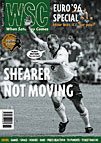 Rich Zahradnik came over from America for Euro '96 and, much to his surprise, found himself in a Catholic country
Rich Zahradnik came over from America for Euro '96 and, much to his surprise, found himself in a Catholic country
I arrived on the morning of the first match of Euro ’96 to find a nation still recovering from “The Shame!!” Members of the England team had had some drinks in a dentist chair then, played rough with the interior of an airplane. Shame was everywhere, the same shame felt by the entire British nation when one of its politicians, vicars, talk show hosts, policemen, soldiers, dogs, cats or royals does something the rest of us probably do all the time anyway.
There is no individual sin in British journalism, only group sin, sin that reflects on a whole nation of polite people in their sitting rooms. How else to explain this sense of collective guilt? I hadn’t encountered it since I spent the fourth grade incarcerated in a Catholic school. I’d always associated the English with a quiet, prim sort of Anglicanism. This shame, it came from my Catholic upbringing, maybe mixed with a little of the Jewish guilt from my Mom’s side of the family.
Shame began the tournament, but once things got going, journalists called up a vast range of operatic emotions – called them up in ways that would have got them laughed out of most any newsroom in America. Check out this from Paul Hayward, profiling Tony Adams in the Daily Telegraph on June 8th: “Adams talks with such unrelenting fervour about pulling on an England shirt that you half expect the three lions on his chest to leap off their badge and give the opposition a good mauling . . .” I’ll interrupt it there. Now imagine an American writing something similar, something like, “Cobi Jones talks with such unrelenting fervour about pulling on the US shirt, you half expect the three stars on his chest to fly off their badge like Kung Fu throwing weapons and embed themselves in the opposition.” Sound ridiculous to you? Does to me.
Hayward wasn’t finished: “He is a product of the kind of English yeoman stock upon which military commanders once drew.” Ahhh . . . the class thing! Translated, this meant, “He is the kind of working class dude some upper class twit ordered over the top in the Great War so he could be turned into Essex tar.”
You can see now why I couldn’t wait to get to the papers every morning. In two weeks travelling around, watching everything from Turkey v Croatia to England v Spain, I read some wacky stuff.
* Time travel: The City Comment section of the Daily Telegraph, writing about Sky’s £184 million-a-year purchase of Premiership TV rights, informed readers: “Following the game has turned from a Saturday afternoon diversion for yobs into a fashionable, classless entertainment.” At least some folks remain quaintly wed to their misconceptions of the sport’s history.
* Historical and cultural references to English opponents I hardly knew existed: David Lacey of the Guardian, whose work I like, managed to get the date of the Armada into the second paragraph of his report on England v Holland. Do English sports writers have a special desk reference that gives them the dates of all the battles England has fought with potential football opponents? And what happens to these same writers, in the ever-expanding football world, when England meets some nation against which it does not have some historical grievance? Is there such a nation?
* Reverse! Reverse! Reverse! (but without SHAME!): After the victory over Holland and before the quarter-final with Spain, the Mirror, in a photo splash, put most of its sports staff in the stocks and showed chief writer Harry Harris and a guy in matador gear being threatened by a Beefeater with an axe. The broadsheets over the next couple of days gleefully reported Harris had refused to participate in the exercise – so his picture had been superimposed – and was taking legal advice. I wondered if that helped sell any more copies of the Mirror.
* A rotter’s manifesto: John Jackson, calling himself ex-Chief Rotter, took the front page of Media Guardian to justify the behaviour of the Rotters, that group of reporters that works for the tabloids’ news desks during a tournament trying to find out nasty things about “our brave lads,” and bate – sorry, aggressively report on – hooligans. According to Jackson, the rotters’ work is critical to the stability of society and a vibrant sports culture. My thinking is, if they’re the crack journalists Jackson claims they are, send them where they’re needed: Liberia, Bosnia or maybe a Hillary Clinton seance.
* The Football Consumers’ Protection Commission: In the middle of the first week, before that great redemptive victory over Scotland, the Mirror sent one of its own rotters, Peter Allen, to Gascoigne’s house. Allen’s job, seemingly as self-appointed chairman of the Football Consumers’ Protection Commission, was to tell Gazza “that ordinary fans deserved more from massively paid stars.” Gazza yelled obscenities, booted a football into the river. This was, I assumed, the Mirror’s contribution to helping the team’s key midfielder prepare for his next match.
Ordinary fans probably do deserve more from their newspapers. But then I’d have nothing to read on vacation. And that would be a real . . . SHAME!!!!
From WSC 114 August 1996. What was happening this month